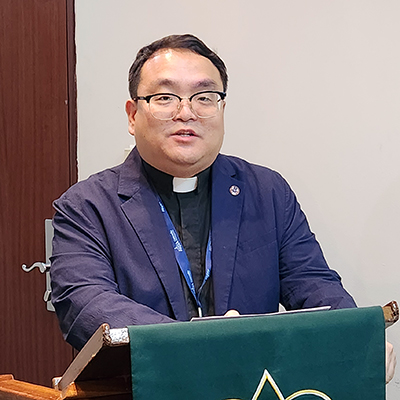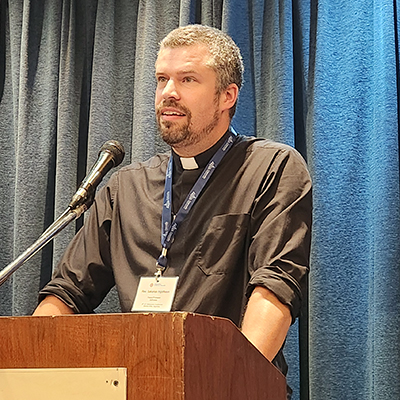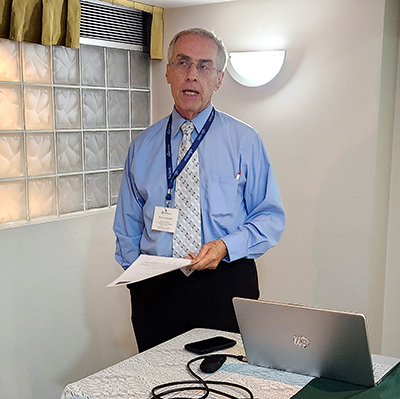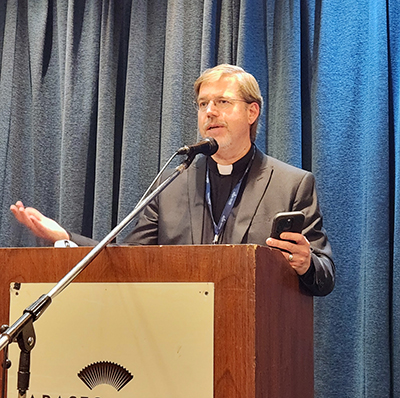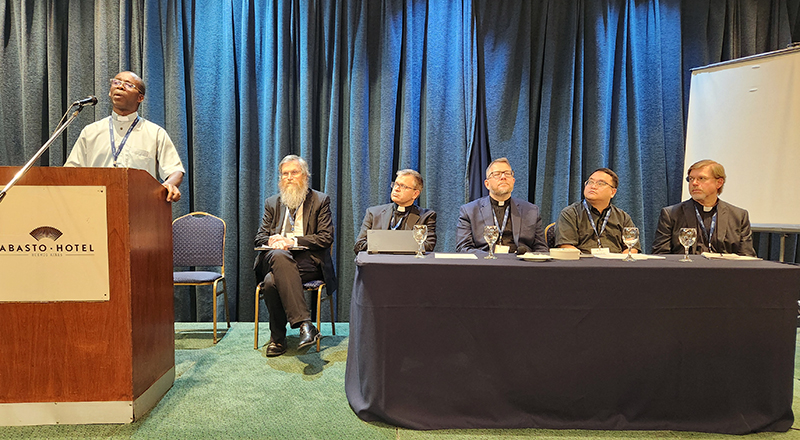
ARGENTINA – The International Lutheran Council’s (ILC) World Seminaries Conference continued during the afternoon of June 13, 2024 with a focus on online education.
Rev. Dr. Alexei Streltsov of the Theological Seminary of Siberian Evangelical Lutheran Church in Russia introduced the topic with a lecture entitled “Pedagogy: A Reflection on Online Teaching after Covid.”
Dr. Streltsov noted that the pandemic several years ago forced many seminaries to consider online education, if they hadn’t already done so before. He suggested that while online education can indeed be useful, particular care should be taken when using it as part of the education of future pastors.
A key consideration he suggested was whether the training of pastors takes place fully online or only partially, and whether the teaching is provided live or pre-recorded. When online education is a “part of a general classroom experience or when there are select online courses in an otherwise residential program, there may be very few objections,” Dr. Streltsov suggested. But training pastors is about more than just academics; it includes moral and pastoral formation. “Formation of habitus of a seminarian is a very important part of the whole process,” he said. And the building of the seminary community—like a “little church”—provides opportunity for growth together with opportunities for “communication between professors and students outside of the classroom” (as well as between students themselves). And in any seminary program, he said, there must also be “a special emphasis on work with local pastors.”
A panel discussion immediately followed the presentation, with four speakers joining Dr. Streltsov and discussing their experience with online education.
Rev. Dr. Ebenezer Boafu, Principal of Lutheran Theological Seminary in Ghana, noted the impetus behind his church’s decision to start an online program was a shortage of pastors. They are now training eligible men for pastoral ministry online, scheduling classes in the evenings to allow them to continue their daily jobs. But there are real challenges, he noted, such as developing relationships between students and enforcing deadlines.
Rev. Ted Kray, Regional Director for Latin America of The Lutheran Church—Missouri Synod (LCMS), reflected on the online training provided by Concordia the Reformer Seminary in the Dominican Republic. He noted the value of online education, given how people all over the world are increasingly connected online (69 percent of people globally already regularly use the internet online). Concordia the Reformer Seminary is taking advantage of this fact by providing for both online and domestic students, as well as utilizing hybrid models of education.
Rev. Dr. Tom Park, an LCMS missionary to Taiwan, reflected on his experience with online teaching at Concordia University Irvine in the United States of America and Lutheran University in South Korea. He noted the challenge of knowing if students are really connecting with what is being said, the difficulty in fostering interpersonal skills, and the increasingly difficult challenge of determining whether students are cheating during tests or potentially using artificial intelligence programs.
Rev. Dr. Chris Caughey explained how his seminary, the American Lutheran Theological Seminary, moved online much earlier than many other Lutheran institutions. Originally, this was in response to financial needs, but they have found it effective for their needs—and their long experience with online education leaves them feeling confident in its use. Challenges remain, however, like detecting plagiarism as well as the potential use of artificial intelligence programs.
Plenary discussion followed, with participants discussing how best to use online technology to supplement pastoral formation while recognizing its limitations.
Parallel sections
The end of afternoon session saw a series of parallel sessions, with participants able to attend two of the four talks.
Rev. Sakarias Ingolfsson, pastor and professor of AdFontes, gave a presentation entitled “Small Churches Need Good Pastors.” In Scandinavia, there is no confessional Lutheran seminary, Rev. Ingolfsson noted, and there are challenges that would make it difficult to operate one in Norway or Iceland. So how is the church to get pastors?
The Lutheran Church in Norway and Iceland (LKNI) decided to create a supplemental program to prepare students for pastoral formation in the LKNI, while letting the students receive their academic education at another seminary. The supplemental program gathers students weekly for liturgical training, lectionary studies, and topical lectures. Students also participate in field education through the congregation in Oslo, and participate in study trips internationally. Finally, students are required to complete an additional year of exchange studies at a seminary of The Lutheran Church—Missouri Synod or Lutheran Church–Canada.
Rev. Dr. Tom Park, LCMS missionary to Taiwan, spoke on “The Necessity of Teaching Luther’s Small Catechism to Theology Students.” Dr. Park noted that the Small Catechism tends not to be studied in seminaries, presumably because it is considered too elementary. But Martin Luther himself considered it among his most important works, and framed his own devotional life around the catechism.
Dr. Park encouraged seminaries to ensure students study the Small Catechism for their own education and meditation, as well as a way of modeling for future pastors how they should teach the Catechism in their own parishes.
Rev. Dr. Joel Heck, Interim President of Concordia Lutheran Seminary in Canada, gave an address entitled “C.S. Lewis for Pastors.” A noted scholar on C.S. Lewis, Dr. Heck highlighted samples of Lewis’ writing and the different genres in which he worked, indicating how his work combines brilliant logic and remarkable imagination.
He further indicated how pastors might make use of Lewis’ writing in their own parishes, and pointed participants to several resources and tools.
Rev. Dr. Chris Caughey told the story of the American Lutheran Theological Seminary. What began small has grown quite large in recent years, with the seminary currently serving more than 60 students (with 35 students in the pastoral track). Due to its success over many years honing an affordable online confessional Lutheran education, Dr. Caughey said that the seminary is also able to assist church bodies in other parts of the world that are looking for assistance in training their pastors.
Students take a full range of confessional Lutheran theological courses that are offered live online. Students are also required to fulfill a one-year vicarage assignment at a congregation in their own country, but this can be fulfilled over two years in the event a student also needs to work to support their family.
A service of Vespers ended the day, with preaching by Rev. Ted Krey.
———————
Find more news on the ILC’s 2024 World Seminaries Conference here.

